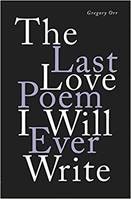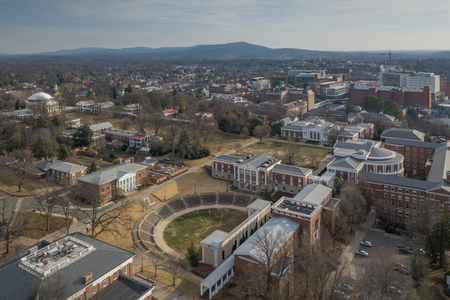She Came to Learn

 As graduation season begins, Gregory Orr gives us “She Came to Learn,” a poem that is steeped in the story of studying at the University of Virginia. Mr. Orr, a professor in the Department of English in the College and Graduate School of Arts and Sciences, will be retiring at the end of the spring semester after “45 long and curious years.” Mr. Orr’s new book of poems, The Last Love Poem I Will Ever Write, will be published next month, and his memoir, The Blessing, will be reissued in August. An interview and podcast with Mr. Orr by Krista Tippett for her National Public Radio show, On Being, will air next month.
As graduation season begins, Gregory Orr gives us “She Came to Learn,” a poem that is steeped in the story of studying at the University of Virginia. Mr. Orr, a professor in the Department of English in the College and Graduate School of Arts and Sciences, will be retiring at the end of the spring semester after “45 long and curious years.” Mr. Orr’s new book of poems, The Last Love Poem I Will Ever Write, will be published next month, and his memoir, The Blessing, will be reissued in August. An interview and podcast with Mr. Orr by Krista Tippett for her National Public Radio show, On Being, will air next month.
SHE CAME TO LEARN
She came to learn, but what and why?
She wanted so badly to move forward
and always there was this circling
back, as if a spiral would define
her progress. Not triumph to triumph
like a series of tests, like graded
promotions toward a promised land
of milk and honey and big cars,
but a slow arc around a center
obscured by clouds—
and a sense that if the mind could
focus, it might pierce those clouds…
—
She moved among them, only
one of many.
Sometimes,
on their way to class, they
seemed a swarm of ants,
a buzzing chaos drifting down
the paths, funneling into the tiny
boxes of the rooms where order
would be imposed and they would
sit in rows to watch as facts
and theories acted out
their dance of rose and cudgel,
grace and circumstance.
She was only one of many,
yet she held tight the thread
of her own destiny
as she wandered
through the labyrinth—
essential hero of her own legend,
which was not written yet,
or, if written, then in a language
she had yet to learn. Sometimes
she glimpsed her message
burning in the red leaves that fell
and stalled in air before her
like burning letters on a blue page.
Sometimes, she found them in the dust
that rose from books she pulled
from shelves– her mortal breath
across the cover lifted up
an ancient cloud and then she
flipped it open in hopes
of revelation.
Always it was herself
she sought, but in another form:
writ large, writ other, writ in
the deepest dialect of the tribe.
The point was: she was here. But
what was the point of being
here? Was it beauty– the way
light stroked the leaves, or
color leaped from branch to branch
to sun-burnished dome and portico?
As if the architecture of rational
desire could mold a destiny and shape
her energy to moral ends? The point
of beauty: that bright and shining
needle that pierced the heart–
that hurt you to a wakeful anguish
where your dreams were stirred…
—
Learning leaned down from the statues,
admonished her with bronze finger
and solemn brow– there were things
she’d need to know. But where
to find them? Perhaps in those rooms
where scholars brooded under
the blackboard’s blank stare
above the rows of bolted chairs.
Perhaps they were scattered
on scraps of paper, hidden deep
in books. Who knew which maps
pertained to her, how she
would find them and piece them
together to make them her own?
There was a journey, begun already
and yet only begun. There was
a destination and a destiny
and the task to make them one.
But that was the future: the place
you pretended to see
as you stood on the blue ridge
and gazed out over the vista.
The future gliding serenely
toward you like those clouds:
huge, billowy habitations
where the lonely, dreaming mind
dwelled. Look down and what you
saw was real and still serene:
the fields and woods laid out
like colors on a pallette.
And in the distance a real village
where the citizens lived and worked
together, and gathered to debate
the fictions that underlay their state,
the myths that moved them and moved
through their veins.
She could see it clearly sometimes–
the point of it all, as she gazed
upward into the distance. It was
a house on a high hill,
planned by a single mind
that synthesized all it thought best.
Like everything made by human
hands, it had cracks and errors
built into the structure, but
were they irreparable? Wasn’t that
what they were here to ponder,
whether what’s good but flawed
can be corrected? A building
like a self; a self like a building.
—
Sometimes a vision came: a field
of corn lit by autumn sun
after the harvesting was done.
She knew it was a ledger page
on which was scripted
the history of her loss and gain:
the stalks and glowing husks,
the random scattered coins of grain.
And there she read the story
of her life: a crpytic page
recording all. She read
until a single cloud arrived
and what was glory turned to shade.
—
The land was dark. The distant
stars gazed down on blackness.
All night she’d studied and now
this pre-dawn chorus of birds
caused her to look up.
By then, the lamp in her
high window was the brightest
heavenly body still lingering
in the sky.
Soon, the east
would be blue. She turned
back to her room, to rigor
and vigil, to purpose,
to coffee and books
and the pad of scribbled notes
and notions. When she looked
again, the sun was already up,
had already laid
its healing hand across the hills.
—
It was like living in a world
suspended above the world:
as she gazed down through glass
at the flow and fight of it all
she thought the glass a lens
that magnified and focused
what she saw. And so it was.
And so she gazed and contemplated
as the seasons passed.
And so, she gathered
at season’s or semester’s end:
those snowy pages of a thesis
she might take into the world.
The world was there. The world
was there. Just then, the glass
dissolved and she remembered
it was her world, where she
belonged.
There on the bank
of the stream, she gave
a final backward glance
in which she saw the scenes
arrayed as points in time,
as notes that made
the necessary music of her life.
- Musings on National Violin Day
- Making the Promise Real: How a UN Tax Convention Can Fulfill the UNDHR’s Vision
- Having a Drink With Your Donkey: The Absurd in Antiquity
- UVA Club of Atlanta: Virtual Pilates Class
- UVA Club of Fairfield/Westchester: Cavs Care - Food Pantry Donation Drive
- UVA Club of Phoenix: Hoo-liday Party


